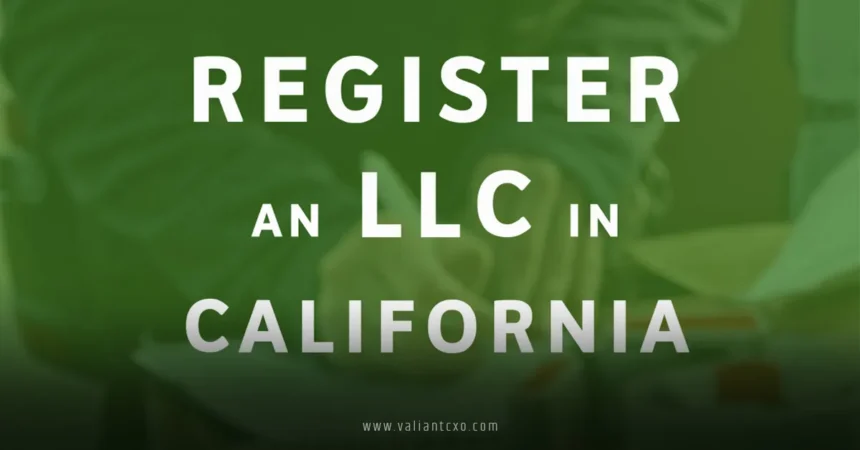How to register an LLC in California is a question buzzing in the minds of countless entrepreneurs eager to launch their dream businesses in the Golden State. Setting up a Limited Liability Company (LLC) in California is like planting a seed for your business—it requires careful planning, nurturing, and a bit of paperwork to blossom into something extraordinary. Whether you’re starting a tech startup in Silicon Valley or a cozy café in San Diego, an LLC offers flexibility, liability protection, and a professional edge. But where do you begin? Don’t worry—I’ve got you covered with this comprehensive, beginner-friendly guide to walk you through every step of the process with clarity and confidence.
In this article, we’ll break down how to register an LLC in California into manageable steps, sprinkle in some practical tips, and address common pain points. By the end, you’ll feel like you’ve got a trusted friend guiding you through the maze of forms, fees, and regulations. Let’s dive in and get your California LLC up and running!
Why Choose an LLC in California?
How to Register an LLC in California : Before we jump into the nitty-gritty of how to register an LLC in California, let’s talk about why an LLC is such a popular choice. Think of an LLC as a sturdy umbrella shielding you from the rain of personal liability. It combines the simplicity of a sole proprietorship with the protection of a corporation, keeping your personal assets—like your home or savings—safe if your business faces legal trouble. Plus, LLCs offer tax flexibility, allowing you to choose how you’re taxed, whether as a sole proprietor, partnership, or corporation.
California’s vibrant economy, from Hollywood’s creative hub to Sacramento’s agricultural backbone, makes it a hotspot for entrepreneurs. However, the state’s unique regulations and fees mean that knowing how to register an LLC in California properly is crucial to avoid costly missteps. Ready to take the plunge? Let’s get started with the first step.
Step-by-Step Guide to Registering an LLC in California
Step 1: Choose a Unique Name for Your LLC
How to Register an LLC in California : Naming your LLC is like picking a name for your newborn—it’s exciting but comes with rules. To register an LLC in California, your business name must be unique and comply with state regulations. It must include “Limited Liability Company,” “LLC,” or “L.L.C.” at the end, and it can’t use restricted words like “bank” or “insurance” without special approval.
Start by brainstorming a name that reflects your brand’s vibe. Then, check its availability using the California Secretary of State’s Business Search tool. If your dream name is taken, try adding a unique twist, like a local landmark or a creative adjective. For example, “Golden Gate Consulting LLC” sounds snappier than plain “Consulting LLC.” Once you’ve got a name, consider reserving it for up to 60 days for a small fee to lock it in while you prepare other documents.
Step 2: Appoint a Registered Agent
How to Register an LLC in California : Every LLC in California needs a registered agent—think of them as your business’s mailbox and legal point of contact. This person or service must have a physical address in California (no P.O. boxes!) and be available during business hours to receive legal documents. You can be your own registered agent if you’re comfortable with the responsibility, but many entrepreneurs opt for a professional service to ensure privacy and reliability.
Why does this matter? Imagine missing a critical court summons because you were on vacation. A registered agent ensures you’re always in the loop. Services like Northwest Registered Agent can handle this for you, often for an annual fee of $100-$200.
Step 3: File Articles of Organization
How to Register an LLC in California : Now, let’s get to the heart of how to register an LLC in California: filing the Articles of Organization (Form LLC-1). This document officially tells the state, “Hey, I’m starting an LLC!” You’ll need to provide details like your LLC’s name, registered agent’s information, management structure (member-managed or manager-managed), and a brief statement of purpose.
You can file online through the California Secretary of State’s website or mail a paper form. The filing fee is $70 as of 2025, but double-check for updates. Filing online is faster, often processed within a few days, while mail can take weeks. Be precise—any errors can delay your approval. Once approved, your LLC is officially born!
Step 4: Create an Operating Agreement
How to Register an LLC in California : While California doesn’t legally require an operating agreement, it’s like a prenup for your business—essential for avoiding future headaches. This internal document outlines how your LLC will operate, including ownership percentages, voting rights, profit distribution, and what happens if a member leaves. It’s especially crucial for multi-member LLCs to prevent disputes.
Picture this: you and your business partner disagree on who gets what profits. Without an operating agreement, you’re stuck in a messy argument. Drafting one doesn’t have to be fancy; you can use online templates or consult an attorney for a custom version. Keep it clear, fair, and signed by all members.
Step 5: Obtain an EIN from the IRS
How to Register an LLC in California : An Employer Identification Number (EIN) is like a Social Security number for your LLC. You’ll need it for tax purposes, opening a business bank account, and hiring employees. The good news? Getting an EIN is free and easy through the IRS website. Just answer a few questions about your LLC, and you’ll get your EIN instantly.
If your LLC is a single-member LLC with no employees, you might not need an EIN for tax purposes, but it’s still wise to get one for banking and professionalism. Trust me, you don’t want to use your personal Social Security number for business transactions—it’s like wearing flip-flops to a board meeting.
Step 6: File a Statement of Information
How to Register an LLC in California :Within 90 days of registering your LLC in California, you must file a Statement of Information (Form LLC-12) with the Secretary of State. This form updates the state on your LLC’s details, like your registered agent and business address. It’s a quick task but easy to forget, like renewing your car registration.
The filing fee is $20, and you’ll need to renew it every two years. Miss the deadline, and you’ll face a $250 penalty—ouch! Set a calendar reminder to stay on top of it. You can file online for convenience, ensuring your LLC stays in good standing.
Step 7: Understand California’s LLC Taxes and Fees
California loves its taxes, and LLCs are no exception. When learning how to register an LLC in California, you need to brace for the state’s unique fees. Every LLC must pay an annual franchise tax of $800, due by the 15th day of the fourth month after your LLC is formed (e.g., April 15 if you register in January). This applies even if your LLC makes zero profit—think of it as California’s entry fee for doing business.
If your LLC earns over $250,000 in gross revenue, you’ll face an additional LLC fee, ranging from $900 to $11,790, depending on income. Don’t panic—careful tax planning with an accountant can help you navigate this. Also, check if you need to register with the California Employment Development Department (EDD) for payroll taxes if you have employees.
Step 8: Secure Necessary Permits and Licenses
California’s regulatory landscape is like a jungle—beautiful but full of surprises. Depending on your business type and location, you may need specific permits or licenses. For example, a restaurant in Los Angeles needs health permits, while a freelance graphic designer might only need a local business license.
Check with your city or county for local requirements, and use California’s CalGold tool to identify permits specific to your industry. Skipping this step is like driving without a license—risky and costly.
Step 9: Open a Business Bank Account
Mixing personal and business finances is like mixing oil and water—it’s messy and hard to separate. Open a dedicated business bank account to keep your LLC’s finances clean. You’ll need your EIN, Articles of Organization, and operating agreement. Most banks, like Chase or Bank of America, offer business accounts with low or no fees for small businesses.
A separate account also makes tax season smoother and reinforces your LLC’s liability protection. Plus, it screams “I’m a legit business owner!” to clients and vendors.
Common Mistakes to Avoid When Registering an LLC in California
Learning how to register an LLC in California is only half the battle—avoiding pitfalls is the other half. Here are some common mistakes and how to sidestep them:
- Choosing a Non-Compliant Name: Double-check your name’s availability and compliance to avoid rejection.
- Skipping the Operating Agreement: Even single-member LLCs benefit from this document for clarity and protection.
- Forgetting the Statement of Information: That $250 penalty hurts—set reminders to file on time.
- Ignoring Taxes: The $800 franchise tax catches many new LLCs off guard. Budget for it from day one.
- Overlooking Permits: Operating without required licenses can lead to fines or shutdowns.
By staying proactive and organized, you’ll breeze through the process like a pro.
Tips for Success After Registering Your LLC
Once you’ve mastered how to register an LLC in California, it’s time to set your business up for success. Keep detailed financial records, either with software like QuickBooks or by hiring a bookkeeper. Network with other California entrepreneurs through local chambers of commerce or events like Startup Grind. Finally, stay compliant by marking your calendar for tax deadlines and renewals.
Think of your LLC as a garden—you’ve planted the seed, but regular care keeps it thriving. Stay curious, seek advice when needed, and don’t be afraid to pivot if your business evolves.
Conclusion
Registering an LLC in California is like embarking on a thrilling road trip—there are twists, turns, and a few tolls, but the destination is worth it. By following these steps—choosing a unique name, appointing a registered agent, filing the right forms, and staying on top of taxes and permits—you’re laying a solid foundation for your business. Knowing how to register an LLC in California empowers you to focus on what you love: building your brand, serving customers, and chasing your entrepreneurial dreams. So, what are you waiting for? Take the first step today and watch your California LLC come to life!
FAQs
1. How long does it take to register an LLC in California?
The time to register an LLC in California depends on how you file. Online filings are typically processed within 5-10 business days, while mailed forms can take 2-3 weeks. Expedited options are available for an additional fee if you’re in a hurry.
2. Can I register an LLC in California without a registered agent?
No, California law requires every LLC to have a registered agent with a physical address in the state. You can act as your own agent or hire a professional service to handle legal documents on your behalf.
3. How much does it cost to register an LLC in California?
The initial filing fee for an LLC in California is $70 for the Articles of Organization. You’ll also need to budget for the $800 annual franchise tax, a $20 Statement of Information fee, and any additional permits or licenses required for your business.
4. Do I need an attorney to register an LLC in California?
While an attorney isn’t required to register an LLC in California, consulting one can be helpful for complex situations, like drafting a detailed operating agreement or navigating industry-specific regulations. For simple LLCs, many entrepreneurs handle the process themselves.
5. Can a non-resident register an LLC in California?
Yes, non-residents can register an LLC in California as long as they appoint a registered agent with a California address. This makes it possible for anyone, anywhere, to start a business in the state.
For More Updates !! : valiantcxo.com


